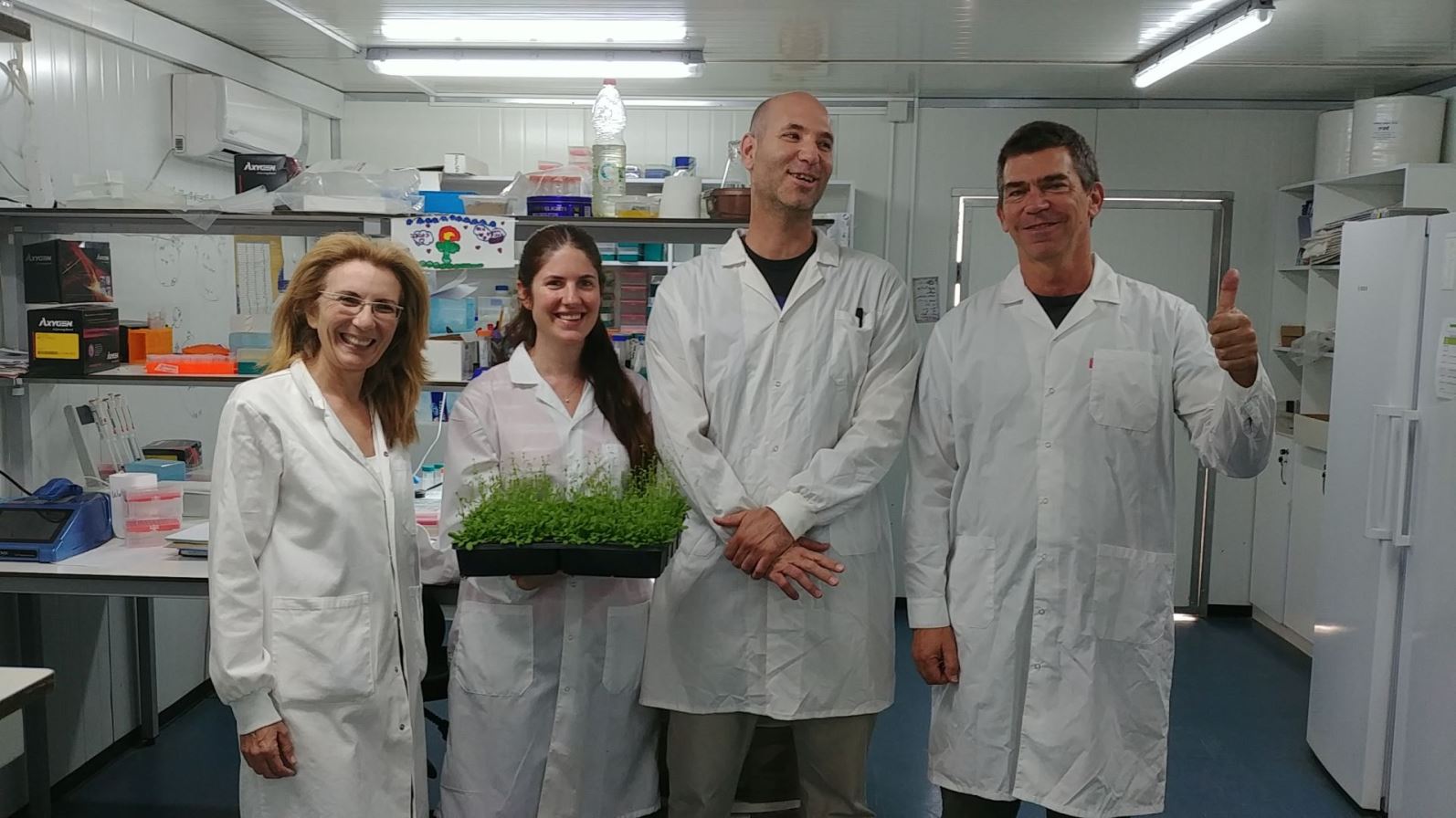 Chłopiec, którego zabito, ponieważ był Żydem
Chłopiec, którego zabito, ponieważ był Żydem
Andrzej Koraszewski
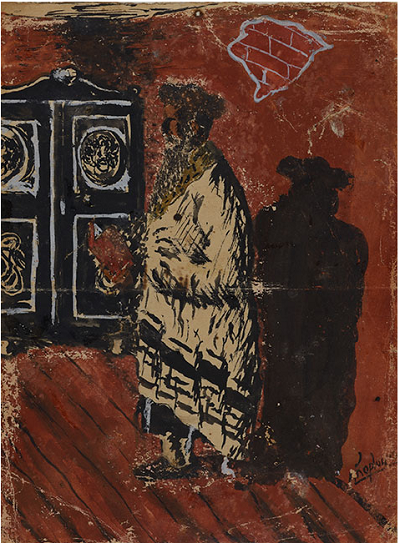
„Modlitwa” obraz namalowany przez Abramka Koplowicza w 1943 roku.
Abramek Koplowicz miał marzenie, że kiedyś obejrzy świat, w swoim wierszu tak to opisywał:
Jak ja mieć będę dwadzieścia lat,
Zacznę oglądać nasz piękny świat.
Usiądę w wielkim ptaku motorze
I wzniosę się w wszechświata przestworze.
Popłynę, pofrunę w świat piękny, daleki,
Popłynę, pofrunę przez morza i rzeki.
Chmura siostrzycą, wiatr będzie mi bratem.
Się będę zdumiewał nad Nilem, Eufratem,
Zobaczę sfinksy i piramidy
W prastarym kraju boskiej Izydy.
Przepłynę nad ogrom wody Niagary
Kąpać się będę w słońcu Sahary.
Przez szczyty Tybetu, co w obłokach giną,
Nad cudną, tajemną magów krainą.
A wydostawszy się spod skwarów mocy
Będę szybował nad lodem Północy.
Przefrunę nad wielką wyspą kangurów
I nad szczątkami Pompei murów.
I nad świętą Ziemią Zakonu Starego
I nad ojczyzną Homera słynnego.
Się będę zdumiewał nad pięknym światem –
Chmura siostrzycą, wiatr będzie mi bratem.
Abramek nie miał żadnych szans na to, żeby to jego marzenie się ziściło. Kiedy pisał te wiersze, był w łódzkim getcie, zarabiając na miskę zupy w warsztacie szewskim. Czasem opisywał to życie żartobliwie, chociaż z innych jego zapisów wiemy jak dobrze rozumiał powagę sytuacji i koszmar otaczającej go rzeczywistości. W wierszu „Hej, w resorcie” pisał:
Hej w resorcie tam wesoło,
Siedzą sobie szewcy w koło,
Biją prosto, biją krzywo, a robota wre aż żywo.
Jeden gwiżdże, drugi śpiewa,
A pan majster się nie gniewa,
Bo jak śpiewa się foxtrota,
Prędzej idzie gwóźdź spod młota.
Nasz pan majster człek morowy,
Filozof on sobie zdrowy,
Jak słówko jakieś powiada,
Głęboko w serce zapada.
Biją młotki z patosem,
Obcęgi klekocą,
Leżą trepy stosem,
A szewcy się pocą,
Za zupę co w resorcie mają.
Te jego wiersze dotarły do polskiego czytelnika po raz pierwszy dopiero w 1993 roku. Wydała je w małym nakładzie „Oficyna Bibliofilów” i dotarły do nielicznych. Były już wtedy znane nie tylko w Izraelu, ale i we Francji.
Dowiedzieliśmy się o Abramku z artykułu zaprzyjaźnionej publicystki „Jerusalem Post”, Sary Honig i zdumieni, że nigdy o nim nie słyszeliśmy, skontaktowaliśmy się z Eliezerem “Lolkiem” Grynfeldem i dostaliśmy od niego zbiorek wierszy Abramka.
Małgorzata, wspólnie z Sarą Lawson przełożyły kilka z nich na angielski (wcześniejsze tłumaczenia na angielski były z hebrajskiego, a nie z polskiego oryginału.) Te tłumaczenia wierszy Abramka opublikowałna swojej stronie Jerry Coyne, a tam znalazła je amerykańska artystka plastyczka, Kelly Houle, która robi bibliofilskie wydania książek niezwykłych. Poruszona tymi wierszami Kelly postanowiła wydać wybrane wiersze Abramka w tłumaczeniu na angielski, najpierw w 60 egzemplarzach na czerpanym papierze, z jej ilustracjami i ręcznie drukowane na starej, klasztornej prasie drukarskiej (potem książka ma ukazać się w normalnym nakładzie). Dostaliśmy już próbny egzemplarz, oprawiony w płótno i zdumiewająco pięknie zrobiony.
Kelly zamieściła na swoim Facebooku kilka zdjęć zrobionych podczas pracy z tą książką
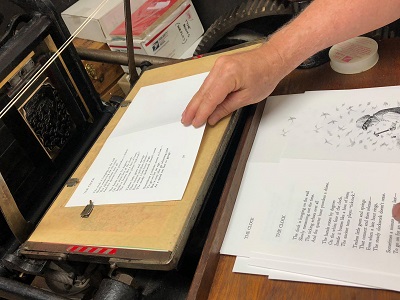 Tu akurat drukowany jest wiersz „Zegar”
Tu akurat drukowany jest wiersz „Zegar”
Wisi zegar na ścianie,
Powoli godziny mierzy,
Po kątach słychać cykanie,
Co kwadrans głośniej uderzy.
Się obracają wskazówki,
Po białej tarczy zegara,
Coś wewnątrz burczy jak mrówki,
I płynie melodja stara.
Bez słuchu się luźni sprężyna,
Kółeczka się obracają.
Już późna wybiła godzina,
A one nie ustawają.
Czasem się dłuży minuta,
Zdaje się być wiecznością,
A gdy jej potrzeba,
Ucieka z zawrotną szybkością.
I wisi zegar na ścianie,
Powoli godziny mierzy.
Po kątach słychać cykanie,
Co kwadrans głośniej uderzy.
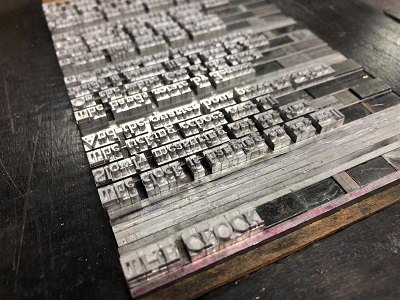
O historii tych wierszy Lolek Grynfeld pisze:
„Dopiero po śmierci (ojczyma) Mendla Koplowicza (a więc w roku 1983 – A.K.) dowiedziałem się o dziejach jego syna Abramka. Po wojnie Mendel odnalazł na strychu ich mieszkania w getcie zeszyt z wierszami pisanymi przez synka, fotografię rodzinną oraz rysunek Żyda owiniętego w tałes, modlącego się przy arce w ubogim pokoju. Mendel oprawił ten rysunek w ramkę i powiesił go w pokoju, ale o zeszyciku Abramka nikomu nie powiedział. Gdy zająłem się badaniem czasu Zagłady, wśród rzeczy pozostałych po Matce i Mendlu znalazłem zeszycik Abramka, a w nim pisane po polsku wiersze. […] Pierwszymi, którzy uznali genialne, wszechstronne zdolności chłopca, unicestwione przez Zagładę, byli właśnie Polacy. Polski dziennikarz Zbigniew Nowak, który mnie odwiedził z grupą polskich pisarzy, zareagował z entuzjazmem i postanowił opublikować te wiersze w Łodzi. Znany poeta i krytyk literacki, Zbigniew Dominiak napisał w przedmowie: ‘Piećdziesiąt lat po śmierci Abramka stajemy oszołomieni wobec ogromnej straty zadanej naszej kulturze’. […]
Gdy opowieść o znalezionym zeszycie Abramka zyskała rozgłos w miejscowej prasie, zgłosiła się znana poetka i tłumaczka, Irit Amiel i przełożyła wszystkie wiersze na hebrajski.”
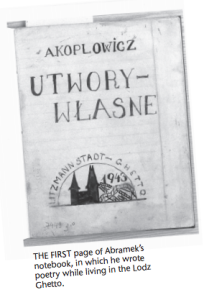
To hebrajskie tłumaczenie wierszy Abramka wydane zostało przez Jad Waszem, a pierwszy egzemplarz przekazany został prezydentowi Ezerowi Weizmanowi.
W Łodzi jest ulica Abramka, jest tam również jego symboliczny grób, słyszałem o planach budowy jego pomnika. Czy bibliofilska książka Kelly Houle z wierszami Abramka Koplowicza i jej ilustracjami dotrze kiedyś do polskich szkół? Mało prawdopodobne, chociaż nie można wykluczyć, że jakieś wydawnictwo zdecyduje się na wydanie jej po polsku.
Zawartość publikowanych artykułów i materiałów nie reprezentuje poglądów ani opinii Reunion’68,
ani też webmastera Blogu Reunion’68, chyba ze jest to wyraźnie zaznaczone.
Twoje uwagi, linki, własne artykuły lub wiadomości prześlij na adres:
webmaster@reunion68.com




